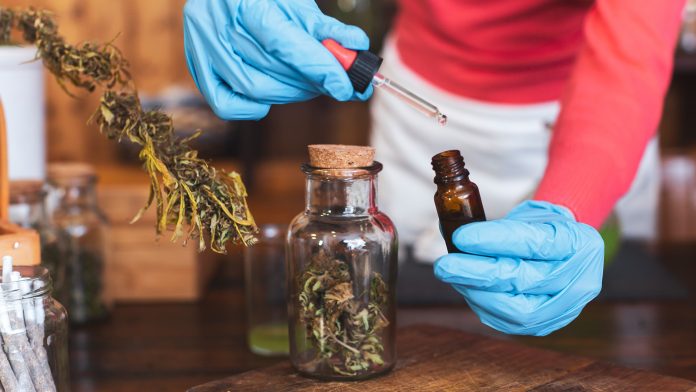
We delve into the cannabis industry with CEO of Materia Ventures, Deepak Anand, who discusses cannabis regulation, the enduring black market, and an idealistic way of advertising cannabis.
Involved in a number of areas across the cannabis industry, Anand, Co-founder and CEO of Materia Ventures, the strategic supplier and distributor of high-quality medical cannabis and CBD products, has participated in numerous policy and regulatory related activities, working with various international governments concerning the world of medical cannabis and recreational cannabis.
Attending MJBizDaily’s European Cannabis Symposium, Health Europa spoke to Anand to gain a deeper insight into the dynamically shifting Canadian cannabis industry. Here we explore the regulation of THC consumption, growing and producing cannabis, the survival of the black market, and the ideal way in which cannabis should be advertised.
Since the legalisation for both the recreational and medicinal use of cannabis, is there a limit regarding the amounts of THC individuals can consume/purchase? How is this being regulated?
On the medical cannabis side, there are limits on the amount of THC in terms of how much can be prescribed by a physician to a patient pursuant to a medical document. For example, capsules are limited to 10mg, and oils are limited to 30mg, however there is no limit for dried cannabis.
On the recreational side, there is not a cap on how much THC can be cultivated. Keep in mind, Canada has legalised recreational cannabis for almost six months now, and currently dried cannabis flowers, pre-rolled (joints/cigarettes) and oils are the only legal forms of recreational cannabis available for sale. The government of Canada will shortly be introducing regulations around additional forms of recreational cannabis products such as edibles, extracts and topicals. There will be limits on the concentration of THC in products, especially with new products coming to market, for example it is proposed that topicals and extracts be limited to 1000mg of THC per package whereas edibles including beverages be limited to 10mg of THC per package. A handy guide to everything the has been proposed can be found here.
This doesn’t necessarily mean that this is the limit that people can consume. For example, if there is a product with a maximum THC concentration of 10mg, and someone is looking to consume 40mg of THC, then they should be able to purchase four packages with 10mg of THC in each package in order to achieve the desired level of concentration.
After legalisation on October 2017, the maximum possession limit for recreational cannabis in a public place is 30 grams of dried cannabis, or the equivalent thereof. As mentioned, if an individual is possessing a product for medical purposes, then there is a different route of purchase and it entitles a higher limit of concentration which can be purchased, whereas recreational has a lower limit. On the medical side, the maximum that can be possessed at any given time is 150 grams of dried cannabis, or the equivalent thereof.
I think essentially, the tricky challenge, from the government’s perspective, was balancing and capping the right dose. As even three milligrams of THC to a novice user could be significant, whereas even 30 milligrams to somebody that has experienced using cannabis could not be much. Therefore, the government has taken the cautious yet pragmatic approach of starting low and going slow in terms of dosage.
Does cannabis have to be state produced across Canada? With the growing demand of cannabis for recreational use, will we see the Government allowing individuals to grow and produce cannabis in their own homes?
The government of Canada, which is Health Canada, controls all the cultivation of cannabis. Anything that would involve cultivation or the production of cannabis, which could either range from the manufacturing of cannabis-based products, including medicinal products, is controlled federally by the government of Canada.
Health Canada issues licenses, and individuals can either get a cultivation licence or a processing licence, or both depending on the activity that they are trying to conduct, those licences are granted federally. Moreover, if the individual is located within the borders of Canada, they can cultivate process cannabis-based products anywhere within the borders of Canada provided that they have approval from their local governments.
There is a large amount of due diligence that goes into this, and many people assume that there is poor regulation in Canada regarding the cultivation of cannabis, however the term ‘poor regulation’ is an inaccurate and opposing way to currently define the industry in Canada.
Cannabis cultivation and processing is done under highly regulated environments in Canada. It is said that anyone can get into the business – that is to say if they fit various requirements the government of Canada imposes on them through security clearances all the way to licensing and sometimes post licensing. Essentially, in theory, yes, the industry is open to anybody to enter. However, such people looking to cultivate cannabis must ensure they have a clean criminal record, and they understand the industry from a business perspective. Moreover, they must have the ability to raise capital to setup, licence and operate a cannabis cultivation or processing business.
We are seeing a lot of individuals get into the industry, under the impression that there is profit in cannabis. The fact is (outside traders on the stock markets), there actually has not been a significant amount of profit being put into people’s pockets to date.
Indeed, there is a lot of money in cannabis, that statement is true. But apart from some isolated examples, there have not been several instances that have resulted in individuals being made very, very rich from the cultivation of cannabis. In fact, I would argue that there is going to be several people and companies that go bankrupt in short order here.
So, yes, while the message is that cultivation and processing of cannabis for medical and recreational purposes is open for anyone, it is vital for individuals to understand that this is within the compliance and regulatory context – which is critical in Canada.
Is there still a black market for cannabis in Canada despite regulation? Is there a way to overcome it?
The media likes to constantly point this out, particularly the fact that there is a black market (I like to call it ‘legacy market’ for cannabis post cannabis legalisation, but it is important to understand that there is a black market for alcohol and there is a black market for cigarettes, and this occurs across various different countries. So yes, there is black market for cannabis. Nobody was expecting for it to have immediately gone away when Canada legalised cannabis.
I think the government of Canada has always said that whilst elimination of the black market was one of their three policy objectives in terms of the legalising of cannabis, no one really expected it to disappear overnight. Having said that, what the government of Canada is very strategically doing is licensing cultivators and producers of cannabis products to meet demand; there are currently 178 producers and this number is growing. If you look very closely at Oregon in the US, they are in an oversupply situation where they have excess cannabis being produced.
What this is doing is that it is driving pricing down. And certainly, in Oregon, there is no black market for cannabis. The cost of cannabis has declined over 50% since Oregon legalised cannabis.
I think balancing supply with demand is the objective that the government of Canada is looking to achieve. Through enforcement via licensing and through meeting supply needs, they aim to drive out the black market. The biggest challenge I see is getting a balance of the right products into the legal market that consumers want and are arguably using through the ‘legacy market’.
There is an ongoing debate regarding alcohol vs cannabis, and with the increasingly innovative ways cannabis is being sold and consumed – Do you think cannabis beverages should be regulated in the same way that alcohol is?
To answer this, we need to first unpack the question. Regarding alcohol versus cannabis, I would argue that cannabis is significantly safer than alcohol as a substance, as it is relatively easy to go into a liquor store and buy enough alcohol that would kill. Whereas, there is no such thing as over consuming cannabis resulting in death or overdosing in the way you can with alcohol. Yes, there are adverse side effects that can seriously harm an individual but not the way that alcohol does.
The second part of this answer is that it is very common to have alcoholic beverages everywhere. Therefore, the availability needs to be there from a perspective of how such products (cannabis beverages) are regulated. Essentially, yes, they should be regulated in a similar fashion to alcohol.
If you look at this from a public policy lens, for example, there is alcohol, and there is tobacco, these are two mainstream products that are out there in society. When the government of Canada looks at this from a regulatory objective, they have found that that alcohol was failing public policy, whereas tobacco was successful public policy.
To further explain this, for tobacco products (cigarettes) there are warning labels and images that show people the dangers of consuming the product. I believe that alcohol policies have failed on several fronts where there are no limitations on products, for example, there are products that appeal to the youth, whereas from a regulatory perspective in comparison, tobacco has still been condensed and refined more from the policy side.
I believe that Canada has done a good job, looking at beverages specifically, where they have made it clear that cannabis beverages cannot look like alcohol. The general approach on beverages has been outlined well, where there is a maximum of THC in a specific beverage and that substances such as alcohol should not be mixed.
There are people that complain about what we have in Canada, but the fact is we are the first jurisdiction in the world to legalise and regulate cannabis-based products including beverages.
Whilst Uruguay has the claim to be the first jurisdiction to regulate cannabis federally, they have not gotten into as much detail as the government of Canada has. It is important to note that the government of Canada has always said this will be a regulatory regime that is extremely tight at the outset and will relax overtime. In fact, the Cannabis Act itself is due for review in just over 2.5 years from now.
It is important to take it slow in terms of the way that beverages relating to cannabis are regulated. This is advice that the federal taskforce received when they visited states such as Oregon, Colorado, etc. in the US that had legalised cannabis for adult use purposes before Canada did. I agree that we should not mix alcohol and cannabis immediately and that there should be limits on THC. These are prudent initial options to go about introducing cannabis-based beverages into any new regulatory framework.
What would you like to see in terms of the way cannabis is being advertised? How do you think the advertising of cannabis should be regulated?
I believe, as mentioned before, that based on the discussion regarding the regulation of tobacco versus alcohol from a public policy perspective, these two objectives should be narrowed down.
I would like to see advertising restricted but restricted to a point where it still makes sense that you can compete with the black market.
Sadly, in Canada, we have decided to take a very conservative perspective on the advertising of cannabis-based products. For example, companies have been age gating their websites, ensuring products are not targeted to minors, have advertisements in places where minors would not visit, and ensuring there is branding and packaging restrictions regarding what a company can say and promote, i.e. there cannot be any celebrity endorsements.
I believe with such methods it is very stifling to grow. It also does not foster elimination of the black market, because particularly in Canada, there are two parallel regimes where the black market essentially can do whatever they want without anyone enforcing them. And then there is the legal industry which is being strangled as companies cannot do any effective marketing due to tight regulations.
Moreover, when you look at this from a CPG (consumer packaged goods) perspective, there is the ideology of the world wanting to be able to promote and market and get these products out, and I believe they should, as long as it is done in a responsible fashion.
I believe responsible marketing and responsible advertising is critical, however what we have seen in Canada to date are very tight regulations around advertising which the government of Canada has introduced but enforcement on both the legal and illegal markets have been scant.
Deepak Anand
Co-founder
CEO
Materia Ventures
Tweet @_deepakanand
Please note, this article will appear in issue 10 of Health Europa Quarterly, which will be available to read in July 2019.








Hello everybody i don’t know if is illegal here but we are a group of dispensary partners in the
states
and we mostly sell medical marijuana,medical cartridges,medical marijuana oil,wax,distillate,all are
also prescribe and also we have our license to ship to mostly patients for example cancer patients so
here is our website link for more inquiries and also how to purchase